北师大版(2019)选择性必修第二册Unit4 Humor Lesson1 What's So Funny课文StoryB课件(共31张PPT)
文档属性
| 名称 | 北师大版(2019)选择性必修第二册Unit4 Humor Lesson1 What's So Funny课文StoryB课件(共31张PPT) |
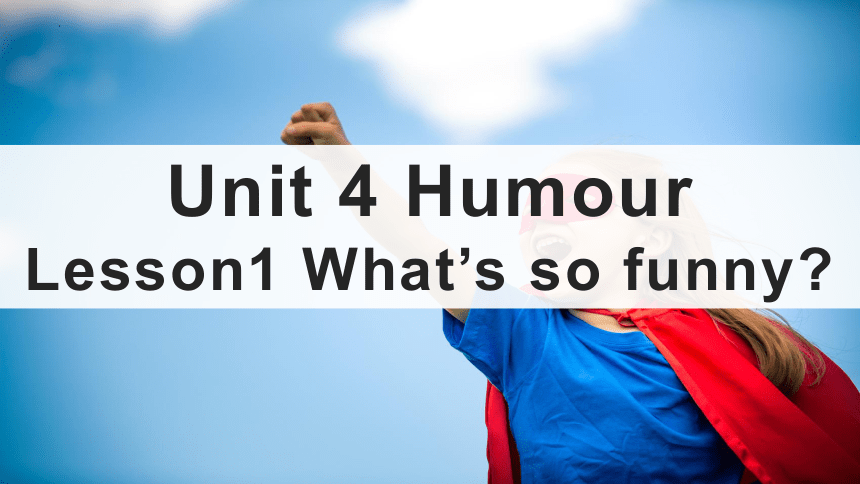
|
|
| 格式 | pptx | ||
| 文件大小 | 1.5MB | ||
| 资源类型 | 教案 | ||
| 版本资源 | 北师大版(2019) | ||
| 科目 | 英语 | ||
| 更新时间 | 2023-10-25 17:58:16 | ||
图片预览

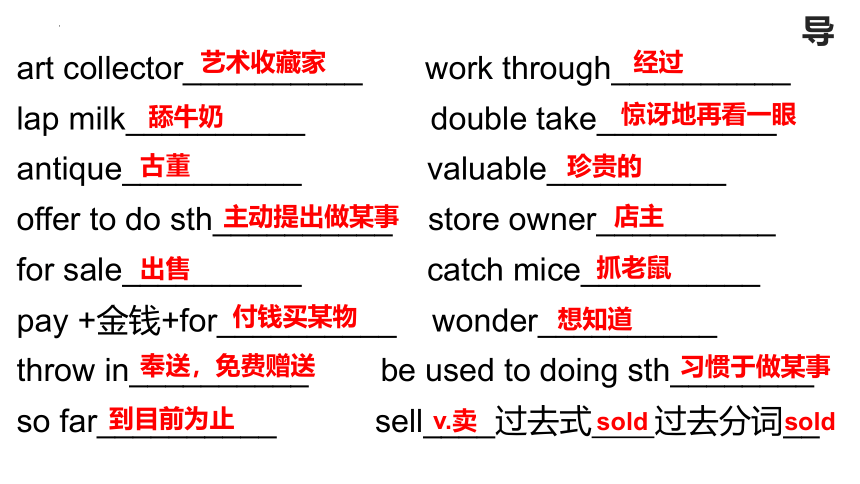

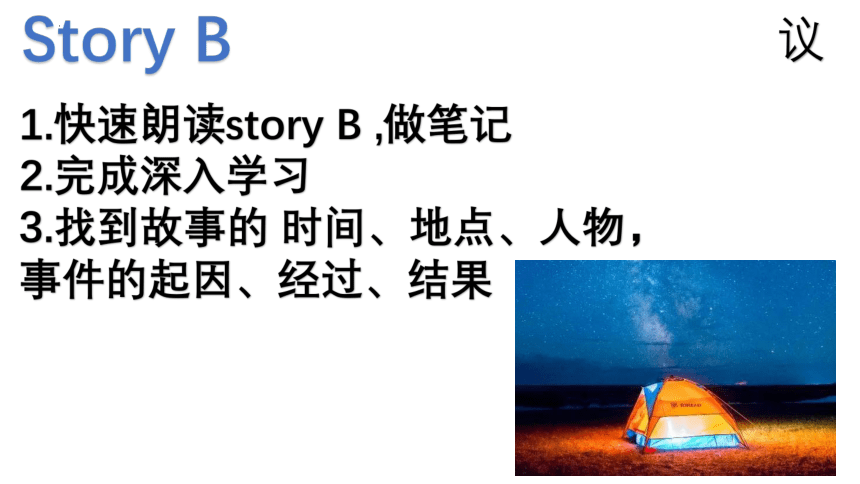
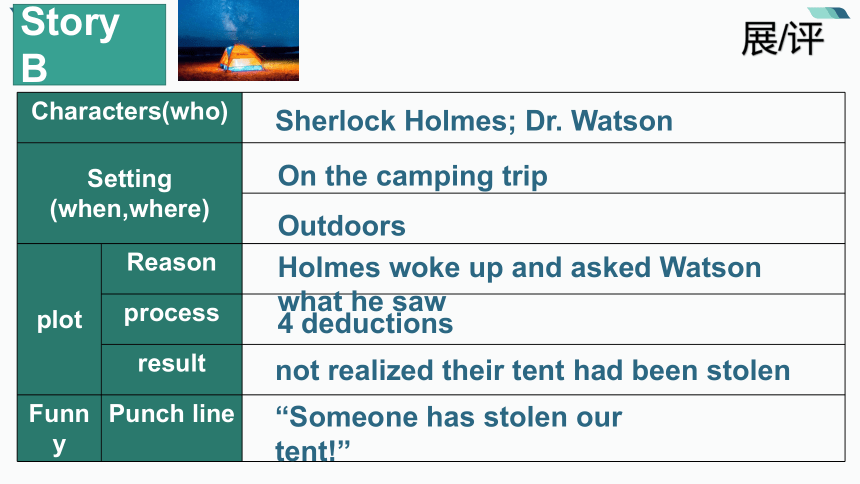
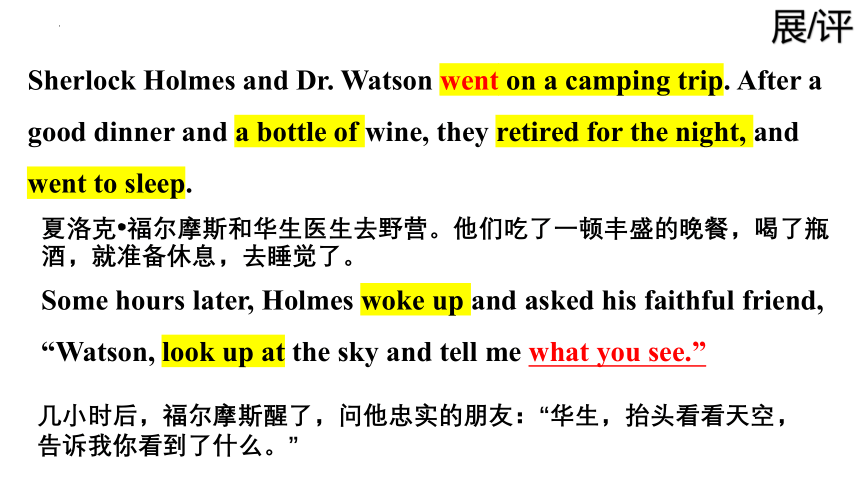
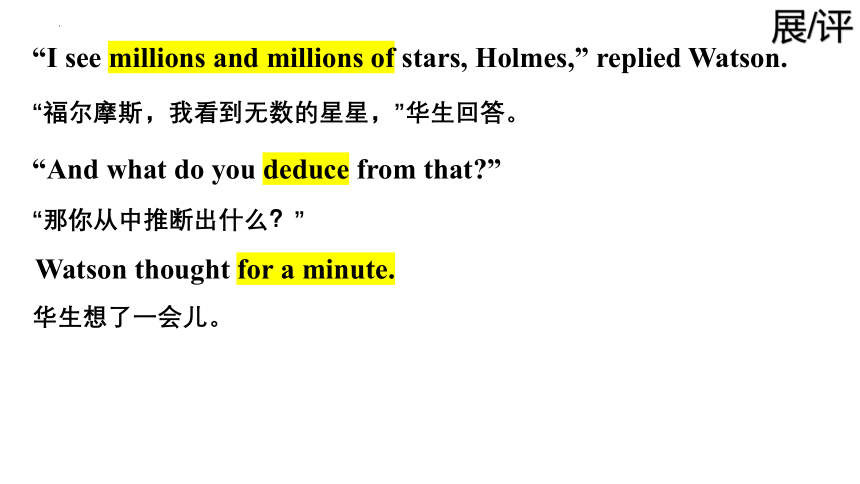
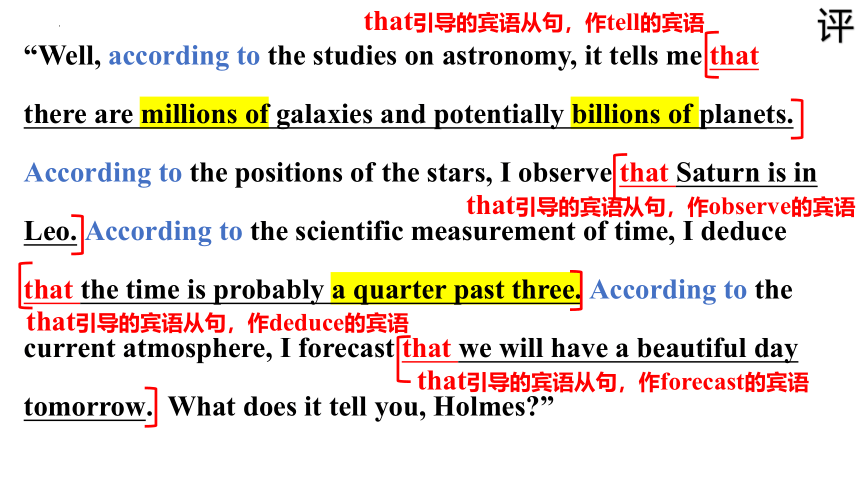
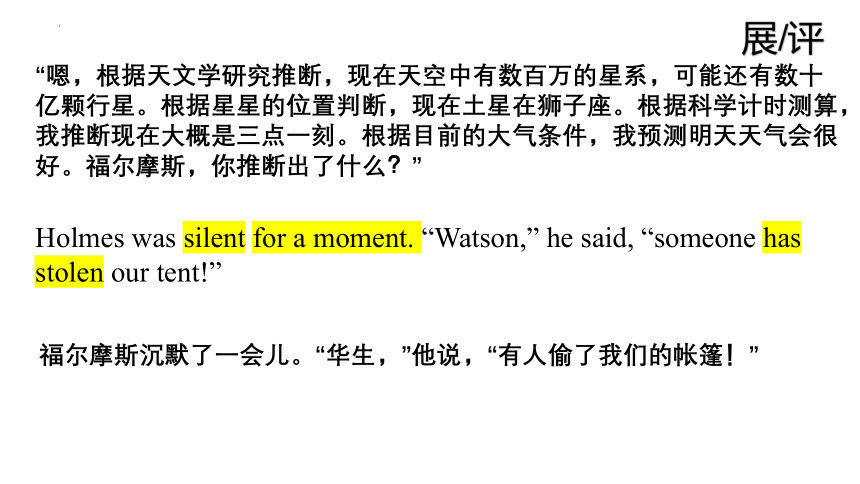
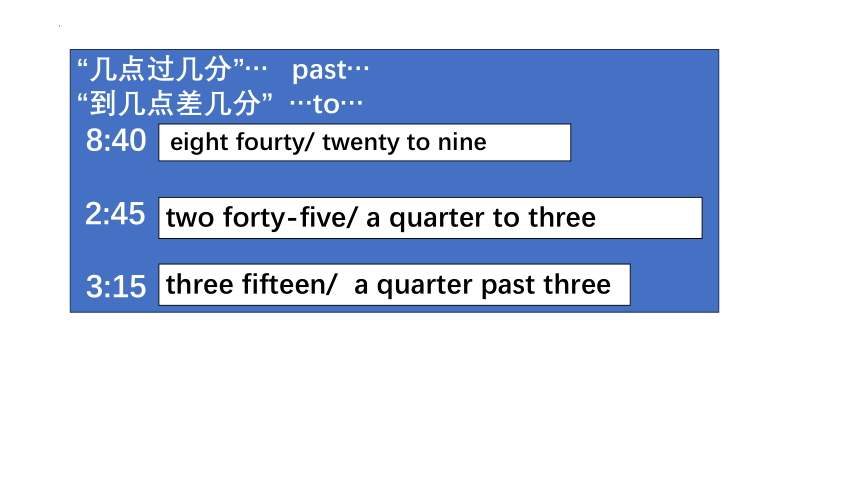
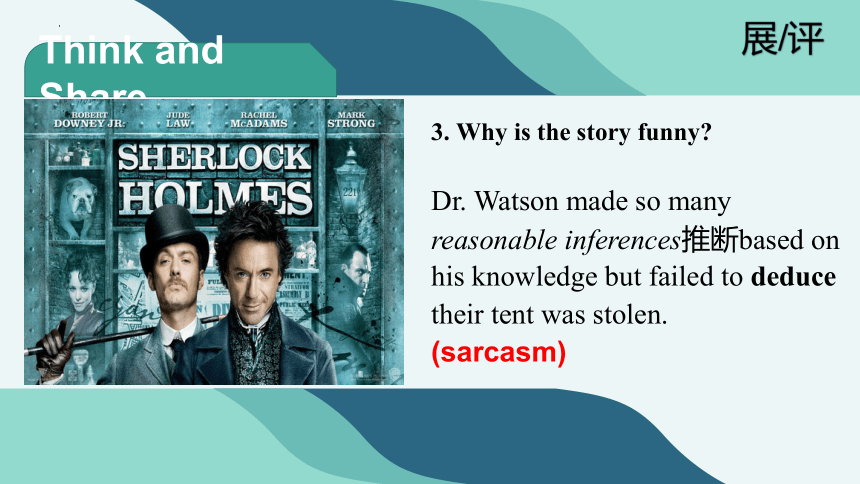
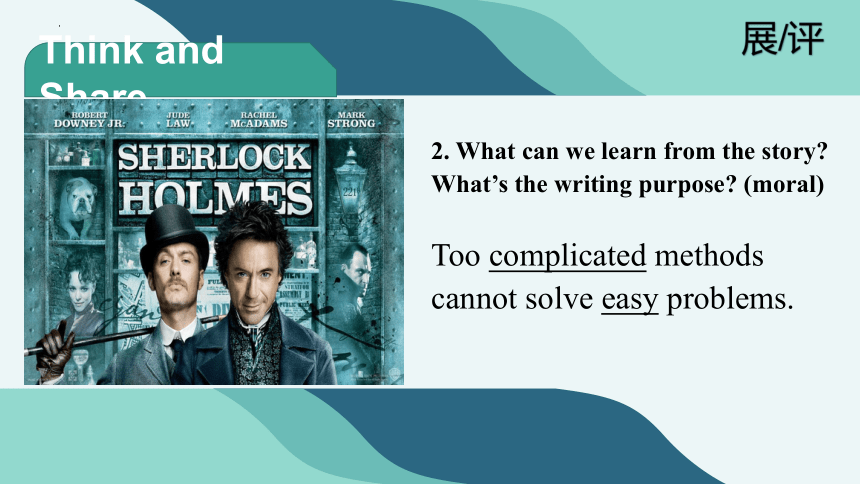
文档简介
(共31张PPT)
Unit 4 Humour
Lesson1 What’s so funny
导
art collector__________ work through__________
lap milk__________ double take__________
antique__________ valuable__________
offer to do sth__________ store owner__________
for sale__________ catch mice__________
pay +金钱+for__________ wonder__________
throw in__________ be used to doing sth________
so far__________ sell____过去式 过去分词__
艺术收藏家
经过
舔牛奶
到目前为止
古董
珍贵的
主动提出做某事
店主
出售
抓老鼠
付钱买某物
想知道
奉送,免费赠送
习惯于做某事
惊讶地再看一眼
v.卖
sold
sold
Story B
思
1.快速朗读story B ,做笔记
2.完成深入学习
3.找到故事的 时间、地点、人物,
事件的起因、经过、结果
Story B
议
1.快速朗读story B ,做笔记
2.完成深入学习
3.找到故事的 时间、地点、人物,
事件的起因、经过、结果
Characters(who)
Setting (when,where)
plot Reason
process
result
Funny Punch line
Story B
Sherlock Holmes; Dr. Watson
On the camping trip
Outdoors
Holmes woke up and asked Watson what he saw
not realized their tent had been stolen
“Someone has stolen our tent!”
4 deductions
展/评
Sherlock Holmes and Dr. Watson went on a camping trip. After a good dinner and a bottle of wine, they retired for the night, and went to sleep.
夏洛克 福尔摩斯和华生医生去野营。他们吃了一顿丰盛的晚餐,喝了瓶酒,就准备休息,去睡觉了。
Some hours later, Holmes woke up and asked his faithful friend, “Watson, look up at the sky and tell me what you see.”
几小时后,福尔摩斯醒了,问他忠实的朋友:“华生,抬头看看天空,告诉我你看到了什么。”
展/评
“I see millions and millions of stars, Holmes,” replied Watson.
“福尔摩斯,我看到无数的星星,”华生回答。
“And what do you deduce from that ”
“那你从中推断出什么?”
Watson thought for a minute.
华生想了一会儿。
展/评
“Well, according to the studies on astronomy, it tells me that there are millions of galaxies and potentially billions of planets. According to the positions of the stars, I observe that Saturn is in Leo. According to the scientific measurement of time, I deduce that the time is probably a quarter past three. According to the current atmosphere, I forecast that we will have a beautiful day tomorrow. What does it tell you, Holmes ”
评
that引导的宾语从句,作tell的宾语
that引导的宾语从句,作observe的宾语
that引导的宾语从句,作deduce的宾语
that引导的宾语从句,作forecast的宾语
“嗯,根据天文学研究推断,现在天空中有数百万的星系,可能还有数十亿颗行星。根据星星的位置判断,现在土星在狮子座。根据科学计时测算,我推断现在大概是三点一刻。根据目前的大气条件,我预测明天天气会很好。福尔摩斯,你推断出了什么?”
Holmes was silent for a moment. “Watson,” he said, “someone has stolen our tent!”
福尔摩斯沉默了一会儿。“华生,”他说,“有人偷了我们的帐篷!”
展/评
“几点过几分”… past…
“到几点差几分” …to…
8:40
2:45
3:15
eight fourty/ twenty to nine
three fifteen/ a quarter past three
two forty-five/ a quarter to three
Think and Share
3. Why is the story funny
Dr. Watson made so many reasonable inferences推断based on his knowledge but failed to deduce their tent was stolen.
(sarcasm)
展/评
Think and Share
2. What can we learn from the story What’s the writing purpose (moral)
Too complicated methods cannot solve easy problems.
展/评
找出文中出现的宾语从句:句子作宾语
1. “Watson, look up at the sky and tell me what you see.”
2. it tells me that there are millions of galaxies and potentially billions of planets.
3. I observe that Saturn is in Leo.
4. I deduce that the time is probably a quarter past three.
5. I forecast that we will have a beautiful day tomorrow.
展/评
宾语从句三大考点:语序、连接词、时态
(1)语序:宾语从句的语序必须是陈述语序 主语+谓语
(2)连接词
that, 无词意,不充当成分,一般可以省略
whether/ if “是否”
连接代词:who, whom, whose, which, what
连接副词:where, how, why, when
(3)时态
主现从不限 主过从必过 客观真理永一现
时态
1.主现从不限 I believe that he is honest.
2.主过从必过 He said he wanted to stay at home
3.客观真理永一现 He said that the light runs faster than the sound.
that
1)连接主从 2) 不作成分 3) 没有任何意义 4)可以省略
The child admitted that he stole the cookie.
那孩子承认他偷了饼干。
I know that patience has its limits. 我知道耐心是有限度的
翻译:他说他很兴奋。
He says (that) he is excited.
评
whether/if
1) 连接主从 2)不作成分 3) 意为:是否
用whether 而不用if :
放句首; 放介词后; 后面紧跟or not;用于to do 不定式之前。
The boss does not mention _______ you can attend the party.
老板没有提到你是否可以参加聚会。
He seemed undecided_______to go or stay. 他似乎还没有决定去留。
I wonder _______ or not I should wear a coat
我不知道该不该穿外套。
whether/ if
whether
whether
评
what什么/who谁/which哪个/whose谁的
1) 连接主从 2)作成分
Dad cannot remember _____ Mom wants for Christmas.
爸爸不记得妈妈想要什么圣诞礼物。
Did you notice _____ broke the window
你注意到是谁打破了窗户吗
I wanted to know____ school it was.
我想知道这是哪所学校。
I wonder ______ this is.
我不知道这是谁的。
what
who
which
whose
评
when什么时候/where哪里/why为什么/how怎样
1) 连接主从 2)作成分
I asked him _______ he'd be back to pick me up.
我问他什么时候回来接我
The old man knew _______ the treasure was kept.
老人知道宝藏藏在哪里。
Tell me _____ you did it. 告诉我你为什么这样做。
I'll show you ______ I load the software.
我给你演示一下如何装入这套软件
when
where
why
how
评
将来进行时
意义
将来进行时表示将来某一时间持续进行的动作
结构
will be doing
用法
1.表示将来某一时间动作正在进行。
I will be doing my homework at 9 o’clock tonight.
今晚9点我将会在做作业。
用法
2.表示纯碎的将来或委婉的语气。
What will you be doing tomorrow
明天你要干什么?
现在完成进行时
意义
现在完成进行时表示动作从过去某一时间开始,一直持续到现在,可能还要继续进行下去。
结构
have/has been doing
用法
1.表示动作从过去某时开始一直到说话时还在进行或可能还要继续下去。通常和“for+时间段或 since+时间点”连用。
It has been snowing for three hours.
(从过去某一时间开始下雪,强调到现在还在下)
用法
2.表示不久前刚刚结束的动作。这种意义通常根据上下文来判断。
Her eyes are red. It’s obvious that she has been crying for a long time.
她的眼睛红红的,显然哭了很长时间。
用法
3.表示在一段持续的时间内动作的多次重复,而这个重复的动作在说话时并不一定在进行。
I have been visiting some cities of China this month.
这个月我一直在访问中国的一些城市。
过去完成进行时
意义
过去完成进行时表示过去某时开始并持续到过去某时结束
结构
had been doing
用法
1.表示发生在过去的过去的某个动作,且该动作持续进行了一段时间。
He had been waiting for his via for days before he got it.
(他在拿到签证之前一直等了好多天)
用法
2.表示过去某一时间之前经常发生的动作。
I had been thinking of you before you came to Shanghai.
在你来上海之前,我常常想起你。
用法
3.表示直到过去某个时间点还在进行的动作。
When he arrived at the station, he found the train had been waiting for passengers.
当他到达火车站时,他发现火车早已经在等候乘客了。
用法
4.表示一定的感彩,如喜欢或厌恶等。
Nobady knew what this fellow had been doing all these days.
没人知道这个家伙这些天一直在干什么。
Unit 4 Humour
Lesson1 What’s so funny
导
art collector__________ work through__________
lap milk__________ double take__________
antique__________ valuable__________
offer to do sth__________ store owner__________
for sale__________ catch mice__________
pay +金钱+for__________ wonder__________
throw in__________ be used to doing sth________
so far__________ sell____过去式 过去分词__
艺术收藏家
经过
舔牛奶
到目前为止
古董
珍贵的
主动提出做某事
店主
出售
抓老鼠
付钱买某物
想知道
奉送,免费赠送
习惯于做某事
惊讶地再看一眼
v.卖
sold
sold
Story B
思
1.快速朗读story B ,做笔记
2.完成深入学习
3.找到故事的 时间、地点、人物,
事件的起因、经过、结果
Story B
议
1.快速朗读story B ,做笔记
2.完成深入学习
3.找到故事的 时间、地点、人物,
事件的起因、经过、结果
Characters(who)
Setting (when,where)
plot Reason
process
result
Funny Punch line
Story B
Sherlock Holmes; Dr. Watson
On the camping trip
Outdoors
Holmes woke up and asked Watson what he saw
not realized their tent had been stolen
“Someone has stolen our tent!”
4 deductions
展/评
Sherlock Holmes and Dr. Watson went on a camping trip. After a good dinner and a bottle of wine, they retired for the night, and went to sleep.
夏洛克 福尔摩斯和华生医生去野营。他们吃了一顿丰盛的晚餐,喝了瓶酒,就准备休息,去睡觉了。
Some hours later, Holmes woke up and asked his faithful friend, “Watson, look up at the sky and tell me what you see.”
几小时后,福尔摩斯醒了,问他忠实的朋友:“华生,抬头看看天空,告诉我你看到了什么。”
展/评
“I see millions and millions of stars, Holmes,” replied Watson.
“福尔摩斯,我看到无数的星星,”华生回答。
“And what do you deduce from that ”
“那你从中推断出什么?”
Watson thought for a minute.
华生想了一会儿。
展/评
“Well, according to the studies on astronomy, it tells me that there are millions of galaxies and potentially billions of planets. According to the positions of the stars, I observe that Saturn is in Leo. According to the scientific measurement of time, I deduce that the time is probably a quarter past three. According to the current atmosphere, I forecast that we will have a beautiful day tomorrow. What does it tell you, Holmes ”
评
that引导的宾语从句,作tell的宾语
that引导的宾语从句,作observe的宾语
that引导的宾语从句,作deduce的宾语
that引导的宾语从句,作forecast的宾语
“嗯,根据天文学研究推断,现在天空中有数百万的星系,可能还有数十亿颗行星。根据星星的位置判断,现在土星在狮子座。根据科学计时测算,我推断现在大概是三点一刻。根据目前的大气条件,我预测明天天气会很好。福尔摩斯,你推断出了什么?”
Holmes was silent for a moment. “Watson,” he said, “someone has stolen our tent!”
福尔摩斯沉默了一会儿。“华生,”他说,“有人偷了我们的帐篷!”
展/评
“几点过几分”… past…
“到几点差几分” …to…
8:40
2:45
3:15
eight fourty/ twenty to nine
three fifteen/ a quarter past three
two forty-five/ a quarter to three
Think and Share
3. Why is the story funny
Dr. Watson made so many reasonable inferences推断based on his knowledge but failed to deduce their tent was stolen.
(sarcasm)
展/评
Think and Share
2. What can we learn from the story What’s the writing purpose (moral)
Too complicated methods cannot solve easy problems.
展/评
找出文中出现的宾语从句:句子作宾语
1. “Watson, look up at the sky and tell me what you see.”
2. it tells me that there are millions of galaxies and potentially billions of planets.
3. I observe that Saturn is in Leo.
4. I deduce that the time is probably a quarter past three.
5. I forecast that we will have a beautiful day tomorrow.
展/评
宾语从句三大考点:语序、连接词、时态
(1)语序:宾语从句的语序必须是陈述语序 主语+谓语
(2)连接词
that, 无词意,不充当成分,一般可以省略
whether/ if “是否”
连接代词:who, whom, whose, which, what
连接副词:where, how, why, when
(3)时态
主现从不限 主过从必过 客观真理永一现
时态
1.主现从不限 I believe that he is honest.
2.主过从必过 He said he wanted to stay at home
3.客观真理永一现 He said that the light runs faster than the sound.
that
1)连接主从 2) 不作成分 3) 没有任何意义 4)可以省略
The child admitted that he stole the cookie.
那孩子承认他偷了饼干。
I know that patience has its limits. 我知道耐心是有限度的
翻译:他说他很兴奋。
He says (that) he is excited.
评
whether/if
1) 连接主从 2)不作成分 3) 意为:是否
用whether 而不用if :
放句首; 放介词后; 后面紧跟or not;用于to do 不定式之前。
The boss does not mention _______ you can attend the party.
老板没有提到你是否可以参加聚会。
He seemed undecided_______to go or stay. 他似乎还没有决定去留。
I wonder _______ or not I should wear a coat
我不知道该不该穿外套。
whether/ if
whether
whether
评
what什么/who谁/which哪个/whose谁的
1) 连接主从 2)作成分
Dad cannot remember _____ Mom wants for Christmas.
爸爸不记得妈妈想要什么圣诞礼物。
Did you notice _____ broke the window
你注意到是谁打破了窗户吗
I wanted to know____ school it was.
我想知道这是哪所学校。
I wonder ______ this is.
我不知道这是谁的。
what
who
which
whose
评
when什么时候/where哪里/why为什么/how怎样
1) 连接主从 2)作成分
I asked him _______ he'd be back to pick me up.
我问他什么时候回来接我
The old man knew _______ the treasure was kept.
老人知道宝藏藏在哪里。
Tell me _____ you did it. 告诉我你为什么这样做。
I'll show you ______ I load the software.
我给你演示一下如何装入这套软件
when
where
why
how
评
将来进行时
意义
将来进行时表示将来某一时间持续进行的动作
结构
will be doing
用法
1.表示将来某一时间动作正在进行。
I will be doing my homework at 9 o’clock tonight.
今晚9点我将会在做作业。
用法
2.表示纯碎的将来或委婉的语气。
What will you be doing tomorrow
明天你要干什么?
现在完成进行时
意义
现在完成进行时表示动作从过去某一时间开始,一直持续到现在,可能还要继续进行下去。
结构
have/has been doing
用法
1.表示动作从过去某时开始一直到说话时还在进行或可能还要继续下去。通常和“for+时间段或 since+时间点”连用。
It has been snowing for three hours.
(从过去某一时间开始下雪,强调到现在还在下)
用法
2.表示不久前刚刚结束的动作。这种意义通常根据上下文来判断。
Her eyes are red. It’s obvious that she has been crying for a long time.
她的眼睛红红的,显然哭了很长时间。
用法
3.表示在一段持续的时间内动作的多次重复,而这个重复的动作在说话时并不一定在进行。
I have been visiting some cities of China this month.
这个月我一直在访问中国的一些城市。
过去完成进行时
意义
过去完成进行时表示过去某时开始并持续到过去某时结束
结构
had been doing
用法
1.表示发生在过去的过去的某个动作,且该动作持续进行了一段时间。
He had been waiting for his via for days before he got it.
(他在拿到签证之前一直等了好多天)
用法
2.表示过去某一时间之前经常发生的动作。
I had been thinking of you before you came to Shanghai.
在你来上海之前,我常常想起你。
用法
3.表示直到过去某个时间点还在进行的动作。
When he arrived at the station, he found the train had been waiting for passengers.
当他到达火车站时,他发现火车早已经在等候乘客了。
用法
4.表示一定的感彩,如喜欢或厌恶等。
Nobady knew what this fellow had been doing all these days.
没人知道这个家伙这些天一直在干什么。
同课章节目录
- Unit 4 Humour
- Lesson 1 What’s So Funny?
- Lesson 2 Why Do We Need Humour?
- Lesson 3 My Favourite Comedian
- Unit 5 Education
- Lesson 1 Enlightening a Mind
- Lesson 2 The Objectives of Education
- Lesson 3 Understanding
- Unit 6 The Media
- Lesson 1 From Page to Screen
- Lesson 2 Questions about Media
- Lesson 3 The Advertising Game
